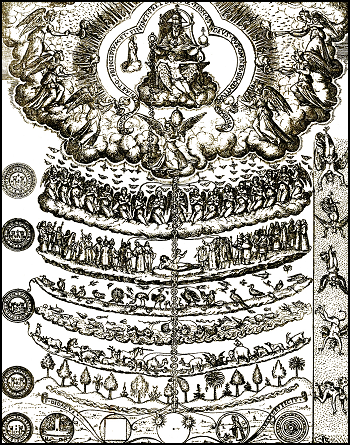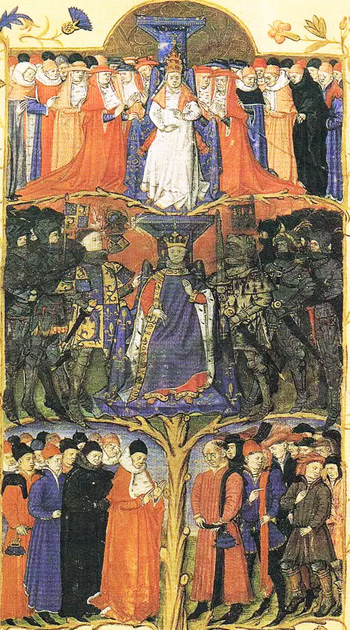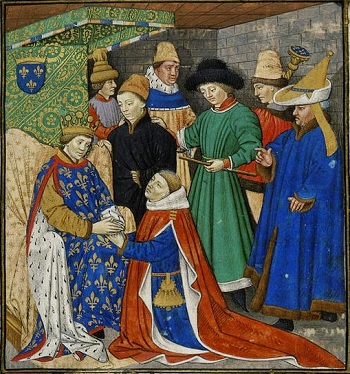Organic Society
 |
 |
 |
 |
 |
 |
 |
Subsidiarity: God, Angels & Men
St. Thomas teaches that the Angels are much more numerous than men because the whole of Creation has parts, and the more important and beautiful parts must be more extensive than the ones less important and beautiful. So, going down the ladder, the ensembles of Angels, men, living beings and inanimate beings become smaller and smaller.
St. Thomas gives the metaphor of a carpet with fringes. The fringes are always smaller than the carpet. Why? It is because the most excellent part of the carpet is the center; the fringes are less excellent, and thus, less abundant, less numerous. Men are, therefore, less numerous than the Angels. This is what he teaches.
 God does not need Angels to do anything because He is omnipotent; an act of His will alone would suffice for the thing to be done immediately. But He created an enormous quantity of Angels to govern the universe in an unequal way. So, through the ministry of the Angels He assists creatures differently, according to their degree of nobility.
God does not need Angels to do anything because He is omnipotent; an act of His will alone would suffice for the thing to be done immediately. But He created an enormous quantity of Angels to govern the universe in an unequal way. So, through the ministry of the Angels He assists creatures differently, according to their degree of nobility.
Our Lord said that God takes care of the birds of the air and knows every hair on our heads that falls. (Mt 6:26) It is clear that watching over a little bird is less noble than attending to what is happening in this meeting, for example.
This meeting deals with an elevated theme: It studies the order God put in Creation, the end of Creation and man’s salvation for the greater glory of God. For this reason, to have this meeting with these explanations that make us better understand the holiness, wisdom and grandeur of God, and the beauty and order of things, is something upon which the attention of God is focused in a more noble way than, let us say, on a rooster fight.
Because God intervenes in Creation according to its hierarchy of nobility, He does this through His countless ministers, the Angels.
He does so with such great splendor that Guardian Angels who have appeared to Saints caused extraordinary impressions. Seeing the Angel, some Saints have thought that his Angel was God Himself. Now then, the Guardian Angels occupy the lesser elevated position in the angelic world: they are the ninth or lowest choir.
For things of lesser importance, God sends His Angels to do them instead of acting Himself. Just as it is proper to the King who has servants to be served by them, so also is it proper to God Who has Angels to act through their ministry.
 Let us imagine that a king is conversing and working with a group of persons in a room. Present are high ranking nobles of the kingdom, several lesser nobles, some of the bourgeoisie, and also plebeians of a lesser social class. The king is thirsty; he rises up and says: “Wait here while I go to drink a glass of water in the kitchen.” He returns and continues his work.
Let us imagine that a king is conversing and working with a group of persons in a room. Present are high ranking nobles of the kingdom, several lesser nobles, some of the bourgeoisie, and also plebeians of a lesser social class. The king is thirsty; he rises up and says: “Wait here while I go to drink a glass of water in the kitchen.” He returns and continues his work.
In fact, this does not happen because one of his servants would eagerly step forward and say: “My Lord, you should not do this. I will go and bring a glass of water for you, because it is not for you to do yourself what you can do by means of your servants.” This is one aspect of the principle of subsidiarity.
It is the same with the Angels. Let us suppose that God decides to make an earthquake in a place where there is an enormous rock that can destroy a neighborhood near the mountain where the rock sets. But God does not want to destroy that area. When God decides to act, several Angels will present themselves before Him and say: “Lord, grant us the honor to move that rock in the way that You so desire.” And God allows them to do this because it is wiser for the Lord to do His great works through the ministry of his servants.
Thus, the glory of God asks for the intervention of Angels of a higher or lesser category, depending on the situation.
A superior with a noncompliant inferior
Moving on to the world of men, hierarchy has such a great value that the higher authority should not be obliged to demand the lesser authority to act against his will. This denial of the lesser authority is already a disorder. But, unfortunately, the lack of the ideal exists quite often in those who are invested with an intermediary authority.
In such cases, the superior should try to induce the inferior to fulfill his duty by using goodness and affection; he might bestow some honor on him to make him more willing to be compliant, for example. He should prefer to do this rather than impose his authority.
But if the inferior continues to be recalcitrant, the superior should speak clearly to him: “My dear Count, I am seeing that in your fief this and that are wrong. It should not continue in this way for such and such reasons. If, upon my next visit, these disorders continue to prevail, I will remove you from your position and replace you with another noble.” This is the correct procedure to follow.
 Sometimes, however, the inconvenience of intervening with the inferior is so great that the superior should avoid doing so, even though damage is taking place. The superior should evaluate whether the harm to the cause is lesser or greater than the harm that will come from obliging the intermediary authority to act properly.
Sometimes, however, the inconvenience of intervening with the inferior is so great that the superior should avoid doing so, even though damage is taking place. The superior should evaluate whether the harm to the cause is lesser or greater than the harm that will come from obliging the intermediary authority to act properly.
Many times the intermediary authority seems to be sleeping; in this case it would appear that the superior should intervene with energy. However, the solution may be different because when one exercises power, things seen from above are very different from things seen from the same level or below. There are difficulties that are not seen from below.
At times, the superior has to give the impression that he also is sleeping until the opportunity appears for him to act. Until that opportunity shows itself, he has to wait.
I understand that this last way of acting can give pretexts for a thousand middle-of-the-road, lazy or fearful actions, perhaps even to justify sympathy for the enemy. I understand the inconvenience of all these possibilities. Nonetheless, it still stands that this is the correct way to do things.
Posted June 11, 2025


St. Thomas gives the metaphor of a carpet with fringes. The fringes are always smaller than the carpet. Why? It is because the most excellent part of the carpet is the center; the fringes are less excellent, and thus, less abundant, less numerous. Men are, therefore, less numerous than the Angels. This is what he teaches.

God's Creation is hierarchical - Angels, men, animate & inanimate beings
Our Lord said that God takes care of the birds of the air and knows every hair on our heads that falls. (Mt 6:26) It is clear that watching over a little bird is less noble than attending to what is happening in this meeting, for example.
This meeting deals with an elevated theme: It studies the order God put in Creation, the end of Creation and man’s salvation for the greater glory of God. For this reason, to have this meeting with these explanations that make us better understand the holiness, wisdom and grandeur of God, and the beauty and order of things, is something upon which the attention of God is focused in a more noble way than, let us say, on a rooster fight.
Because God intervenes in Creation according to its hierarchy of nobility, He does this through His countless ministers, the Angels.
He does so with such great splendor that Guardian Angels who have appeared to Saints caused extraordinary impressions. Seeing the Angel, some Saints have thought that his Angel was God Himself. Now then, the Guardian Angels occupy the lesser elevated position in the angelic world: they are the ninth or lowest choir.
For things of lesser importance, God sends His Angels to do them instead of acting Himself. Just as it is proper to the King who has servants to be served by them, so also is it proper to God Who has Angels to act through their ministry.

Feudalism reflected the divine hierarchy, with Religion above the nobility & the commoners
In fact, this does not happen because one of his servants would eagerly step forward and say: “My Lord, you should not do this. I will go and bring a glass of water for you, because it is not for you to do yourself what you can do by means of your servants.” This is one aspect of the principle of subsidiarity.
It is the same with the Angels. Let us suppose that God decides to make an earthquake in a place where there is an enormous rock that can destroy a neighborhood near the mountain where the rock sets. But God does not want to destroy that area. When God decides to act, several Angels will present themselves before Him and say: “Lord, grant us the honor to move that rock in the way that You so desire.” And God allows them to do this because it is wiser for the Lord to do His great works through the ministry of his servants.
Thus, the glory of God asks for the intervention of Angels of a higher or lesser category, depending on the situation.
A superior with a noncompliant inferior
Moving on to the world of men, hierarchy has such a great value that the higher authority should not be obliged to demand the lesser authority to act against his will. This denial of the lesser authority is already a disorder. But, unfortunately, the lack of the ideal exists quite often in those who are invested with an intermediary authority.
In such cases, the superior should try to induce the inferior to fulfill his duty by using goodness and affection; he might bestow some honor on him to make him more willing to be compliant, for example. He should prefer to do this rather than impose his authority.
But if the inferior continues to be recalcitrant, the superior should speak clearly to him: “My dear Count, I am seeing that in your fief this and that are wrong. It should not continue in this way for such and such reasons. If, upon my next visit, these disorders continue to prevail, I will remove you from your position and replace you with another noble.” This is the correct procedure to follow.

The superior carefully balances the exercise of his authority over the inferior
Many times the intermediary authority seems to be sleeping; in this case it would appear that the superior should intervene with energy. However, the solution may be different because when one exercises power, things seen from above are very different from things seen from the same level or below. There are difficulties that are not seen from below.
At times, the superior has to give the impression that he also is sleeping until the opportunity appears for him to act. Until that opportunity shows itself, he has to wait.
I understand that this last way of acting can give pretexts for a thousand middle-of-the-road, lazy or fearful actions, perhaps even to justify sympathy for the enemy. I understand the inconvenience of all these possibilities. Nonetheless, it still stands that this is the correct way to do things.
Posted June 11, 2025

Organic Society was a theme dear to the late Prof. Plinio Corrêa de Oliveira. He addressed this topic on countless occasions during his life - at times in lectures for the formation of his disciples, at times in meetings with friends who gathered to study the social aspects and history of Christendom, at times just in passing.
Prof. Plinio
Atila S. Guimarães selected excerpts of these lectures and conversations from the transcripts of tapes and his own personal notes. He translated and adapted them into articles for the TIA website. In these texts fidelity to the original ideas and words is kept as much as possible.
______________________
______________________






